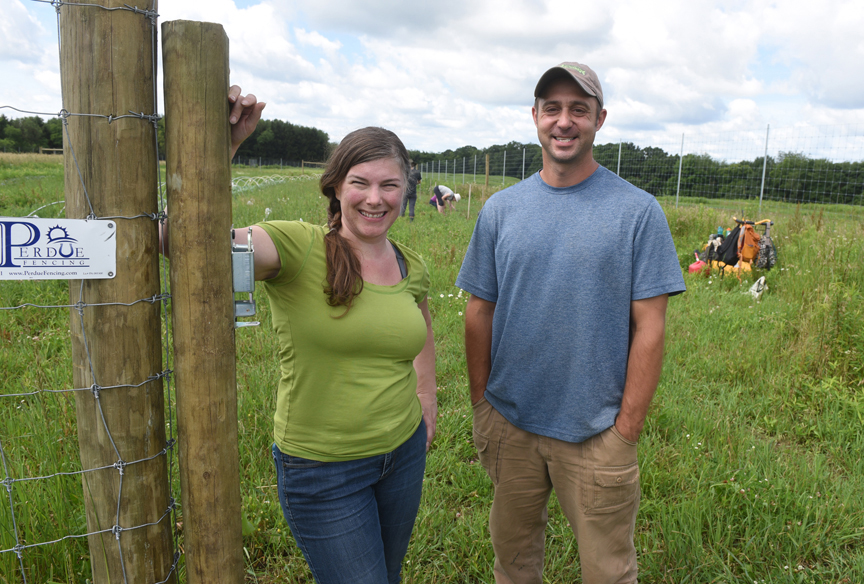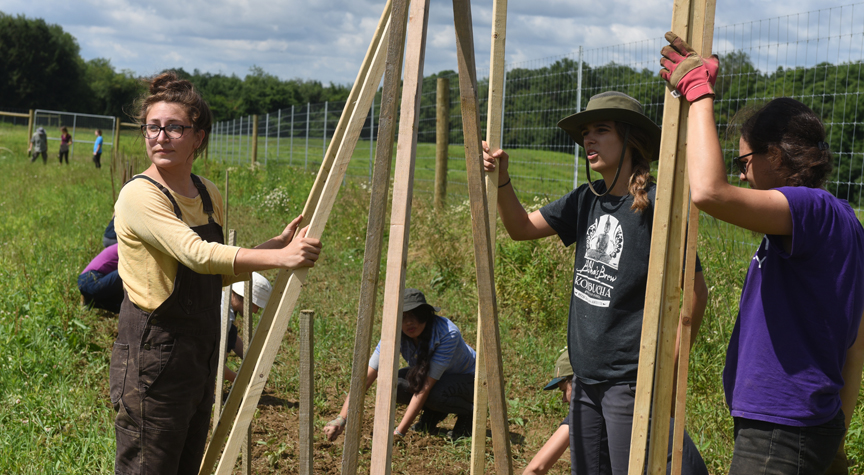Food bank garden at Chatham University feeds hungry, teaches students
Posted on: September 26, 2019 | Written By: Doug Oster |
Tony Miga is supervising the installation of tall, three-legged supports for pole beans in the one-acre plot at Chatham University’s Eden Hall Campus. The director of the farm on the Pittsburgh area campus is working with three students who he’s charged with caring for the growing of vegetables for the Greater Pittsburgh Community Food Bank’s Green Grocer truck with his help.
The university and food bank have teamed up for a symbiotic project that will teach valuable lessons to the students and provide good food for the hungry.
The food bank has wanted to develop agricultural programs around its building in Duquesne, but the land at the former industrial site is not suited for growing food.
It only took one meeting between the food bank’s Lori Diefenbacher and Miga to make the deal. Just six months later, the official agreement was put into place.

Lori Diefenbacher is produce and agricultural programs coordinator for the Greater Pittsburgh Community Food Bank. She’s working with Tony Miga who is farm director at Chatham University’s Eden Hall Campus. Miga, along with students and food bank volunteers are growing food for the food bank’s Green Grocer truck which serves 17 different food desert areas in Allegheny County. Photos by Doug Oster
“It gives students an opportunity to get farming experience,” Miga says, “but they also get to follow that produce beyond here and work with the food bank and see how it’s getting used, why it’s important and get to see the communities the food bank serves.”
The farm is planted with sweet potatoes, Brussels sprouts, turnips, mustard greens, cantaloupe, pole beans, carrots, broccoli and more. It’s cared for by around a dozen students and a group of volunteers from the food bank.

(left to right) Maura Rapkin, Bradley Barrow and Kaeli Evans are all students at Chatham University. They are setting up supports for pole beans earlier in the season. They are working to grow food for the Greater Pittsburgh Community Food Bank’s Green Grocer truck.
Maura Rapkin, a student coordinator at the farm, enjoys the hard work and the planning, along with all of the others who spend time with her in the fields.
“I love working with all these different people who are passionate about good food, good farming practices and building a better food system,” she says with a smile.
When asked what her biggest challenge was, she answered, “weeds,” with a laugh.
Like most farmers, Miga has his hands full and has delegated much of the responsibility to Rapkin, Bradley Barrow and Kaeli Evans. He has confidence in all three and knows that the planning, planting and growing have many benefits.
“Farming is part art and part science,” he says. “It’s setting goals, looking ahead and trying to make improvements over time. This offers an opportunity for students to do that.”
Even though learning the business end and how to make a profit is critical, there’s a bigger picture, he adds.
“There’s real value in growing good, healthy food and serving communities that want good healthy food,” he says. “It adds a whole other layer of motivation.”
Besides growing everything organically, the team is going further focusing on sustainability. On the agenda are improving the soil, land ecology and biodiversity though their farming practices.
The Brussels sprouts are covered with a floating row cover the day they are planted to physically stop cabbage loopers from laying eggs, which hatch into cabbage worms. When other pests find their way in or to other crops, a variety of natural methods are used to keep the produce safe.
“It’s better for the plants, it’s better for the soil and better for the people that are eating it,” Miga says of the food grown here.
Not only does Evans spend time at the farm, she also spends time working on the Green Grocer truck, so she gets to see the food reach its destination.
“I love working on the farm,” she says. “Actually getting to grow food, but then making sure people who need it get it.”
That’s something that Diefenbacher, the food bank’s produce and agricultural programs coordinator, likes to hear. The truck travels to 17 sites around Allegheny County that don’t have access to fresh food.
Everyone welcome at Green Grocer truck
Anyone can purchase food regardless of income from the Green Grocer vehicle using cash, debit, SNAP (Supplemental Nutrition Assistance Program) card and Farmer’s Market coupons.
The food bank’s nutrition team creates recipes and prints them on recipe cards along with doing demonstrations on how to make the dishes.
“There are so many food deserts in the Pittsburgh region,” Diefenbacher says. “We really want our Green Grocer truck to be able to get out there and allow people to have access to fresh produce so they have healthier diets and happier lives.”
Since August, the farm has been producing three to four crates a week filled with green beans, cabbage, cantaloupe, onions, carrots and more. When the truck shows up, this produce is in high demand.
“It’s very exciting,” Diefenbacher says. “We see smiles on people’s faces. It’s really a privilege to offer healthy, delicious food to people.”
Soon the sweet potatoes, Brussels spouts and more greens will be harvested.
Barrow, one of the student leaders, has learned a lot working on the farm and appreciates the ability to help.
“I think it’s great that the food bank trusts us to make decisions based on our knowledge and background,” he says.
That’s just one of the lessons Miga is glad to see taught in this collaboration. The best part though might be seeing the results of all the hard work and where the food ends up.
“Nothing makes me feel better,” he says, “than being able to interact with the people who really enjoy and appreciate the stuff we are growing.”
Doug Oster is editor of Everybody Gardens, a website operated by 535Media, LLC. Reach him at 412-965-3278 or doster@535mediallc.com. See other stories, videos, blogs, tips and more at everybodygardens.com.
Details: For more information and a complete schedule of the Green Grocer Truck go here.
Chatham University’s Eden Hall Campus.
More from Everybody Gardens
Somali group transforms vacant city lots into lush farmland.
Video: Keeping rutting bucks off saplings.
Perennial hibiscus are easy to grow and add great fall color to the garden.